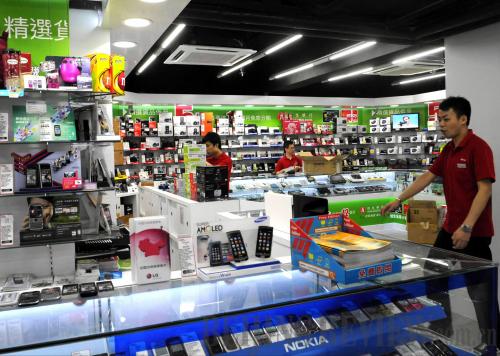|
 |
|
CONTROVERSIAL GOME: On September 30, Gome employees make preparations before opening a flagship store in Hong Kong (HUANG BENQIANG) |
But such a fundraiser would dilute Huang's shares from 34 percent to 28 percent, which would compromise Huang's one third stake which guarantees him the right to veto board decisions. Huang believed the proposed fundraising was aimed to take away his control of Gome, said a manager close to Huang.
Chen's move fanned the flames of Huang's discontent and made the conflict between the two captains of industry public. On August 4, Huang demanded a special shareholders' meeting to remove Chen. The meeting was eventually held in late September.
Ahead of the meeting, the Chen-supported Bain Capital converted its HK$1.8 billion ($232 million) bondholding in Gome into a 9.98-percent equity stake, becoming the second-largest shareholder of Gome and diluting Huang's holding in the company from 34 percent to 32.47 percent on September 15.
The plan to issue more stocks was scrapped at the September 28 meeting, and Huang remains the largest Gome shareholder with his 32.47-percent stake. Chen has also retained his position as the chairman of Gome.
So far, the damage appears limited, but that might not last if Huang holds true to his threat to sell about 400 Gome stores he privately owns, a move that would drastically reduce Gome's income and competitiveness.
Gome "has strayed from the path of profitable growth, resulting in deteriorating core competency and losing its industry leadership," said the statement filed by Huang's family after the meeting.
It also said, "Nothing has changed about our concerns regarding the unrepresentative nature of the board, and we reserve all our rights to take appropriate action to protect our interest and that of other shareholders.''
Gome's shares have declined 15 percent this year, against a more than 2-percent gain in the benchmark Hang Seng Index. Its closest and larger rival, Shenzhen-listed Suning Appliance, has gained about 16 percent in the same period and about 60 percent since mid-May.
Future of family businesses
Gome's first-half profit rose 66 percent to 962.3 million yuan ($143.6 million) from a year earlier, as Gome closed unprofitable outlets. However, Huang claimed the store closures came at the cost of losing market share. Still, the gains were better than that of Suning Appliance, which reported a 53.3-percent year-on-year rise in first-half net profit to 2.6 billion yuan ($388 million) from its 1,075 outlets.
The conflict between Gome's founder and top executive raises the question: How can China's family-run businesses effectively implement modern corporate governance during the country's economic transition when a growing number of private companies strive to go public?
Traditionally, founders of most of China's private companies run the businesses on their own and become the largest shareholders of their listed companies. Conflicts tend to arise when they hand over part of the controlling power to the board, which answers to shareholders.
The Chinese version of Forbes, in a September 14 survey, said that the chiefs of China's family businesses had misgivings over the possibility of losing control of their firms in private equity fundraising and were prudent about such practices.
The survey also found more than 40 percent of first-generation entrepreneurs of non-public companies were prepared for entrusting professional business executives instead of their children with ensuring sustainable development of their businesses. Only 13.7 percent of the respondents demanded that their children be the sole executives of their family businesses.
Based on the annual financial reports of Chinese listed companies in 2009, the Forbes survey found 35 percent, or 115 of the 305 listed family businesses now employ professional managers for positions such as general manager, president and CEO.
Potential conflicts
But it's also a fact that the board of directors in many companies serves a somewhat puppet-like role. Founders or the founding families still have the final say in deciding issues vital to the development of these businesses.
Under such circumstances, conflicts between founders and business executives will eventually break out. Gome stands out as the first of such cases.
The vote at Gome's special shareholders' meeting is "historic," which "could be a vote on whether China's private companies should practice corporate governance," said Zhou Jiangong, Editor in Chief of the Chinese version of Forbes, in his blog.
Family businesses must be transformed into modern corporations, and China's enterprises need excellent professional managers, Zhou said.
The Chinese traditionally view professional managers as housekeepers and value most loyalty. But loyalty to professional managers, while defined within the context of modern corporate system, means honesty and trustworthiness for all shareholders, not just one family, he said.
Problems will continue to emerge concerning the management of private companies in China because of the absence of sufficient legal guarantees, but "we need to be patient and tolerant, allowing family businesses time to complete the transition and become competent public companies," said Han Zhaohua, a researcher with the Institute of Economics under the Chinese Academy of Social Sciences. | 